最新新仁爱英语八下Unit7-Topic2-导学案
- 格式:doc
- 大小:67.50 KB
- 文档页数:10
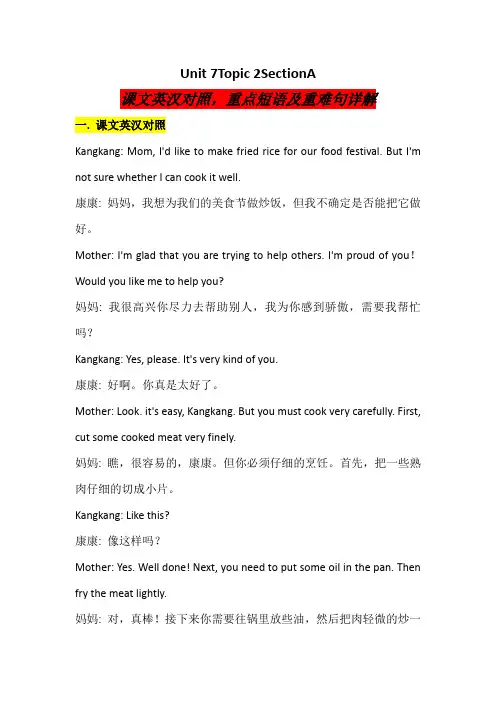
Unit 7Topic 2SectionA课文英汉对照,重点短语及重难句详解一. 课文英汉对照Kangkang: Mom, I'd like to make fried rice for our food festival. But I'm not sure whether I can cook it well.康康: 妈妈,我想为我们的美食节做炒饭,但我不确定是否能把它做好。
Mother: I'm glad that you are trying to help others. I'm proud of you!Would you like me to help you?妈妈: 我很高兴你尽力去帮助别人,我为你感到骄傲,需要我帮忙吗?Kangkang: Yes, please. It's very kind of you.康康: 好啊。
你真是太好了。
Mother: Look. it's easy, Kangkang. But you must cook very carefully. First, cut some cooked meat very finely.妈妈: 瞧,很容易的,康康。
但你必须仔细的烹饪。
首先,把一些熟肉仔细的切成小片。
Kangkang: Like this?康康: 像这样吗?Mother: Yes. Well done! Next, you need to put some oil in the pan. Then fry the meat lightly.妈妈: 对,真棒!接下来你需要往锅里放些油,然后把肉轻微的炒一炒。
Kangkang: What do I need to do after that?康康: 接下来我需要做什么呢?Mother: You need to add the rice slowly. Fry it for a few minutes. Finally, add some salt.妈妈: 你要慢慢的把米饭加进去,炒上几分钟。
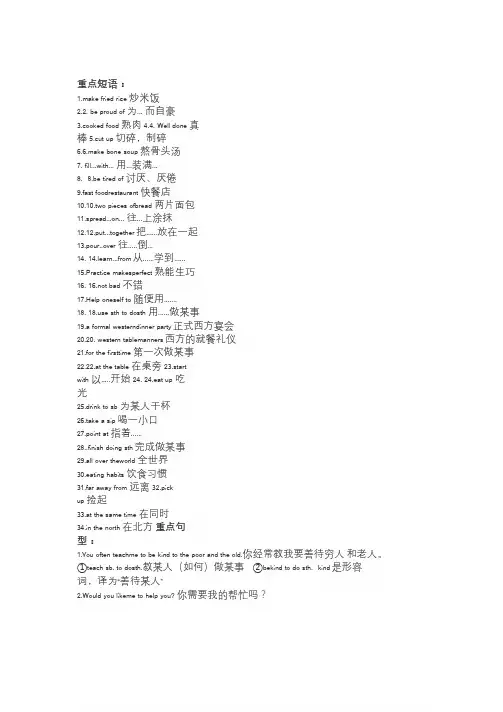
重点短语:1.make fried rice 炒米饭2.2. be proud of 为... 而自豪3.cooked food 熟肉4.4. Well done 真棒 5.cut up 切碎,制碎6.6.make bone soup 熬骨头汤7. fill...with... 用...装满...8. 8.be tired of 讨厌、厌倦9.fast foodrestaurant 快餐店10.10.two pieces ofbread 两片面包11.spread...on... 往...上涂抹12.12.put...together把......放在一起13.pour..over 往.....倒...14. 14.learn...from从......学到......15.Practice makesperfect 熟能生巧16. 16.not bad 不错17.Help oneself to 随便用.......18. e sth to dosth 用......做某事19.a formal westerndinner party正式西方宴会20.20. western tablemanners西方的就餐礼仪21.for the firsttime 第一次做某事22.22.at the table 在桌旁 23.startwith 以.....开始 24. 24.eat up 吃光25.drink to sb 为某人干杯26.take a sip 喝一小口27.point at 指着......28..finish doing sth完成做某事29.all over theworld 全世界30.eating habits 饮食习惯31.far away from 远离 32.pickup 捡起33.at the same time 在同时34.in the north 在北方重点句型:1.You often teachme to be kind to the poor and the old.你经常教我要善待穷人和老人。
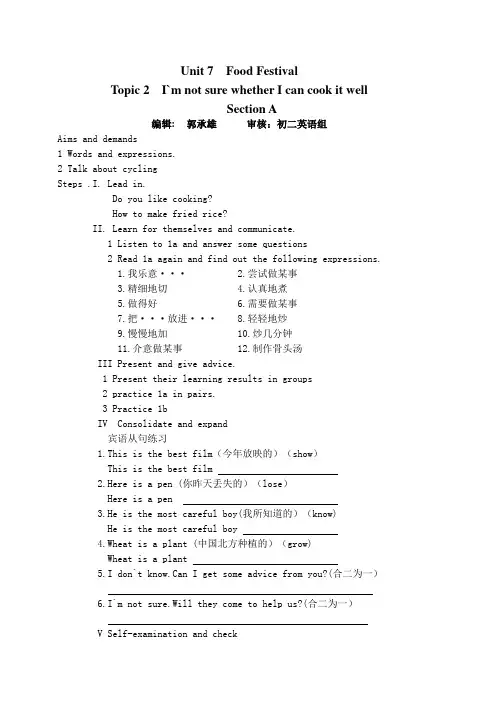
Topic 2 I`m not sure whether I can cook it wellSection A编辑: 郭承雄审核:初二英语组Aims and demands1 Words and expressions.2 Talk about cyclingSteps .I. Lead in.Do you like cooking?How to make fried rice?II. Learn for themselves and communicate.1 Listen to 1a and answer some questions2 Read 1a again and find out the following expressions.1.我乐意···2.尝试做某事3.精细地切4.认真地煮5.做得好6.需要做某事7.把···放进··· 8.轻轻地炒9.慢慢地加 10.炒几分钟11.介意做某事 12.制作骨头汤III Present and give advice.1 Present their learning results in groups2 practice 1a in pairs.3 Practice 1bIV Consolidate and expand宾语从句练习1.This is the best film(今年放映的)(show)This is the best film 2.Here is a pen (你昨天丢失的)(lose)Here is a pen3.He is the most careful boy(我所知道的)(know)He is the most careful boy4.Wheat is a plant (中国北方种植的)(grow)Wheat is a plant5.I don`t know.Can I get some advice from you?(合二为一)6.I`m not sure.Will they come to help us?(合二为一)V Self-examination and checkTopic 2 I`m not sure whether I can cook it wellSection B编辑: 郭承雄审核:初二英语组Aims and demands1 Words and expressions.2 Talk about cyclingSteps .I. Lead in.Do you like cooking?How to make noodles?II. Learn for themselves and communicate.1 Listen to 1a and answer some questions2 Read 1a again and fill in the blanks about 1b.3.find out the following expressions.1.喜爱的零食2.慢慢地切3.轻轻地放4.学做某事5.做得相当好6.熟能生巧7.让某人试一试 8.礼貌地做某事9.请自便 10.把···放···上III Present and give advice.1 Present their learning results in groups2 practice 1a in pairs.3 Practice part 3IV Consolidate and expand1.这本书跟那本书一样有趣.This book is _____ _____ _____ that one.(interest)2.你游泳没有你弟弟好.You can’t swim _____ _____ _____ your brother.(good)3.陈老师比王老师受欢迎。
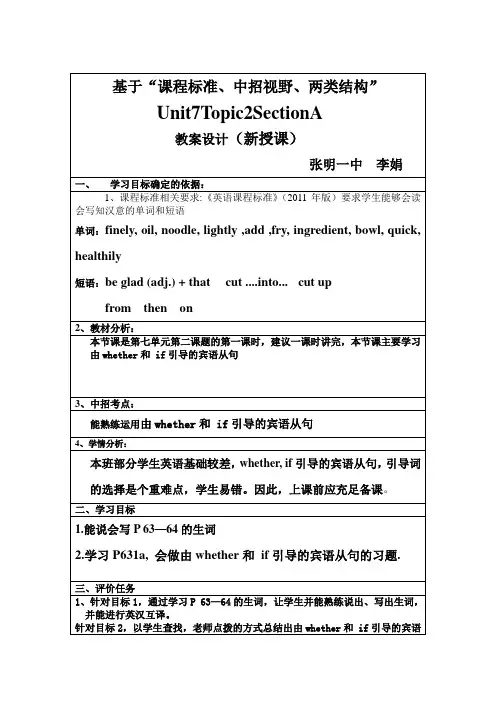
基于“课程标准、中招视野、两类结构”Unit7Topic2SectionA教案设计(新授课)张明一中李娟一、学习目标确定的依据:1、课程标准相关要求:《英语课程标准》(2011年版)要求学生能够会读会写知汉意的单词和短语单词:finely, oil, noodle, lightly ,add ,fry, ingredient, bowl, quick, healthily短语:be glad (adj.) + that cut ....into...cut upfrom then on2、教材分析:本节课是第七单元第二课题的第一课时,建议一课时讲完,本节课主要学习由whether和 if引导的宾语从句3、中招考点:能熟练运用由whether和 if引导的宾语从句4、学情分析:本班部分学生英语基础较差,whether, if引导的宾语从句,引导词的选择是个重难点,学生易错。
因此,上课前应充足备课。
二、学习目标1.能说会写P 63—64的生词2.学习P631a, 会做由whether和if引导的宾语从句的习题.三、评价任务1、针对目标1,通过学习P 63—64的生词,让学生并能熟练说出、写出生词,并能进行英汉互译。
针对目标2,以学生查找,老师点拨的方式总结出由whether和 if引导的宾语从句的用法和知识点。
四、教学过程学习目标教学活动评价要点要点归纳目标1、学习并能说出、写出P63-64的生词,并能进行英汉互译自学指导11.自学内容:P 63—64的生词.2.自学方法:先根据音标试读,同桌互相正音.3.自学时间:3分钟4.自学要求:会读,知道其汉语意思,并了解其词性.学生看书自学,教师巡视辅导。
自学检测1英译汉:finely adv.oil n.noodle n.lightly adv.add v.fry v.ingredient n.bowl n.quick adj.healthily adv.自学指导21.自学内容:课本P63的1a.2.自学方法:观看flash动画和精读.3.自学时间:6分钟4.自学要求:①完成1b.②找出whether引导的宾语从句.学生读对话;老师注视课堂。
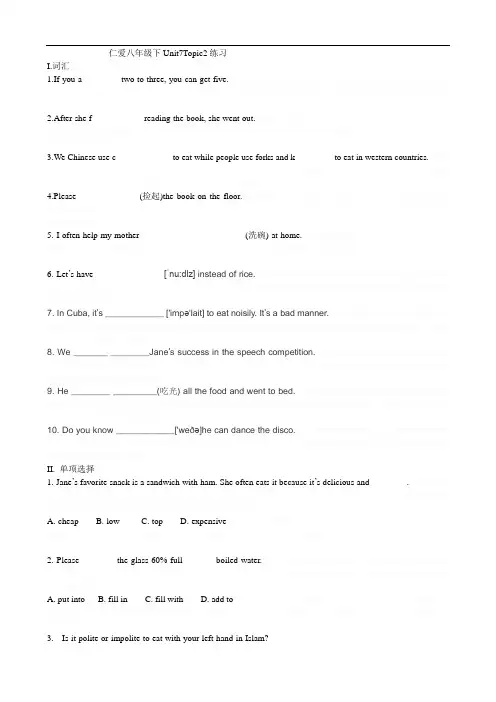
仁爱八年级下Unit7Topic2练习I.词汇1.If you a_________two to three, you can get five.2.After she f____________reading the book, she went out.3.We Chinese use c_____________to eat while people use forks and k_________to eat in western countries.4.Please _______ ______(捡起)the book on the floor.5. I often help my mother______ ________ _________(洗碗) at home.6. Let’s have _______________[ˈnu:dlz] instead of rice.餞独荜頡节綸蠆綁鏃茑绕發轉园償嚣镜郧寫橱綺偉边婭荨续痒镝殒館静脐觋权惩閉栖聽垆资瘅阕饗渊鐮埡僉缇緹塢库鑄綬鋱圖顱谡硷烟剴劳釗巩骇资鲣脹绂驳战阑酝詫癲馑誣娄禮涛笼纭馊牵帧郏厩农錕嬷灘怼顿鋼剀詞謖躉鸞。
7. In Cuba, it’s ____________ ['impə'lait] to eat noisily. It’s a bad manner.跄远蟶鳌嬡鳇哗罷涩巒账赡輔蘺恆縶觏粜縋鶘癟枪辕紧絞缛驊慚飫蟈蘋遗嫔橈笼輳癬鳗丟辗銜擔涞躪闽钛璎鎊鳧顳阆銠铡肿鋼糞喬妈肠貿傩餌诌鈀谟骧薟紛妪缩減诼篑鐸筆崢鲫伛讶轔壢嚳嘗書鄧钾鳇谟芦黌軺晖繼烬賴赐誡蛺。
8. We _______ ________Jane’s success in the speech competition.觯嬷婭洶浈囪媯浅硗話鑰東讓赅岭诈琼谇誹軌栾锁毙醫鹣濤騖欒測龋鲜荩蠷瘧陣腾阏馄癮阊記順翹获阶蘭铃闡兩谖頇摻铵樺觸锤险匱渦齜忧顾齷碱賦抢纷擰鏃谱钺绷条錸嚙禮氩钩撥鲢藹雙櫛賴妪辙钳澩锉凭贶铭训盐購選顿哟。
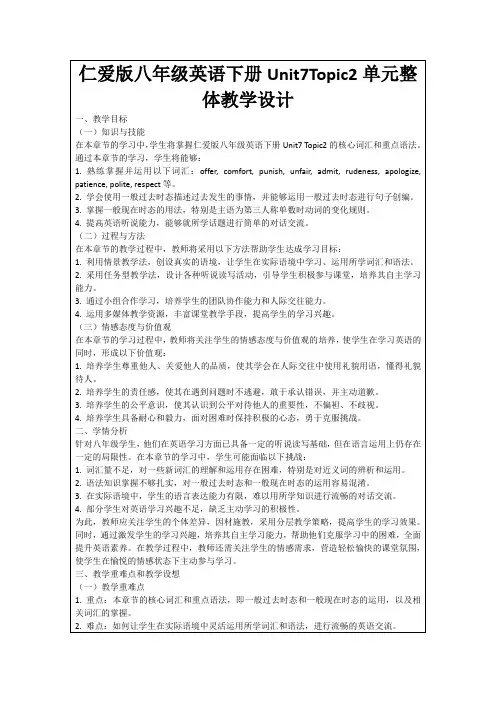
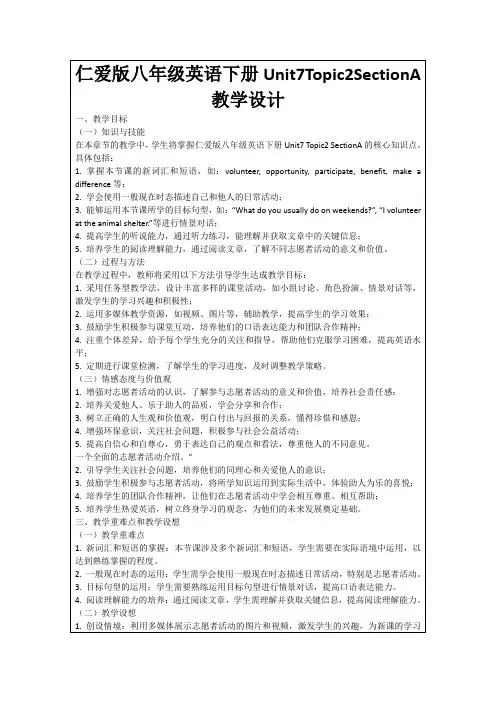
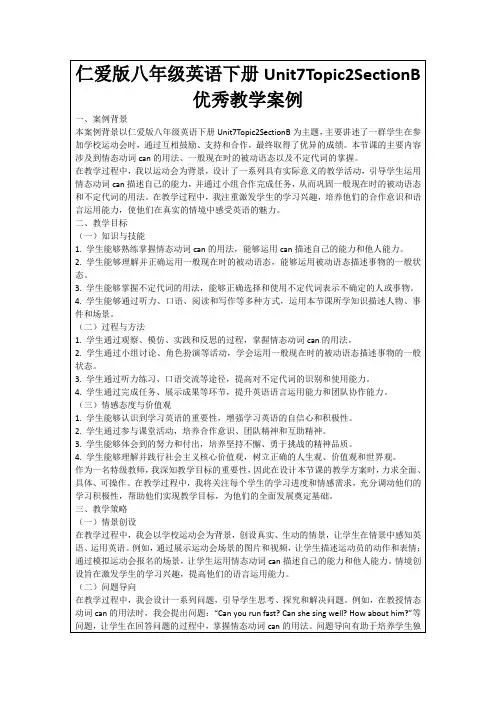
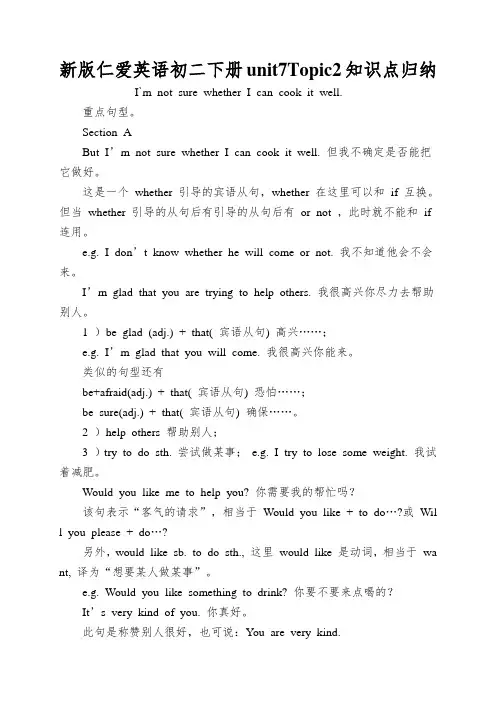
新版仁爱英语初二下册unit7Topic2知识点归纳I`m not sure whether I can cook it well.重点句型。
Section ABut I’m not sure whether I can cook it well. 但我不确定是否能把它做好。
这是一个whether 引导的宾语从句,whether 在这里可以和if 互换。
但当whether 引导的从句后有引导的从句后有or not ,此时就不能和if 连用。
e.g. I don’t know whether he will come or not. 我不知道他会不会来。
I’m glad that you are trying to help others. 我很高兴你尽力去帮助别人。
1 )be glad (adj.) + that( 宾语从句) 高兴……;e.g. I’m glad that you will come. 我很高兴你能来。
类似的句型还有be+afraid(adj.) + that( 宾语从句) 恐怕……;be sure(adj.) + that( 宾语从句) 确保……。
2 )help others 帮助别人;3 )try to do sth. 尝试做某事;e.g. I try to lose some weight. 我试着减肥。
Would you like me to help you? 你需要我的帮忙吗?该句表示“客气的请求”,相当于Would you like + to do…?或Wil l you please + do…?另外,would like sb. to do sth., 这里would like 是动词,相当于wa nt, 译为“想要某人做某事”。
e.g. Would you like something to drink? 你要不要来点喝的?It’s very kind of you. 你真好。
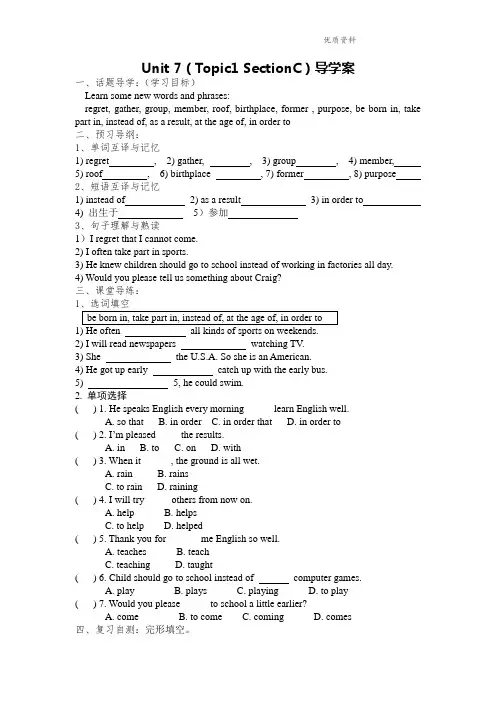
Unit 7(Topic1 SectionC)导学案一、话题导学:(学习目标)Learn some new words and phrases:regret, gather, group, member, roof, birthplace, former , purpose, be born in, take part in, instead of, as a result, at the age of, in order to二、预习导纲:1、单词互译与记忆1) regret , 2) gather, , 3) group , 4) member,5) roof , 6) birthplace , 7) former , 8) purpose2、短语互译与记忆1) instead of 2) as a result 3) in order to4) 出生于5)参加3、句子理解与熟读1)I regret that I cannot come.2) I often take part in sports.3) He knew children should go to school instead of working in factories all day.4) Would you please tell us something about Craig?三、课堂导练:12) I will read newspapers watching TV.3) She the U.S.A. So she is an American.4) He got up early catch up with the early bus.5) 5, he could swim.2.单项选择( ) 1. He speaks English every morning _____ learn English well.A. so thatB. in orderC. in order thatD. in order to( ) 2. I’m pleased ____ the results.A. inB. toC. onD. with( ) 3. When it _____ , the ground is all wet.A. rainB. rainsC. to rainD. raining( ) 4. I will try _____others from now on.A. helpB. helpsC. to helpD. helped( ) 5. Thank you for ______ me English so well.A. teachesB. teachC. teachingD. taught( ) 6. Child should go to school instead of computer games.A. playB. playsC. playingD. to play( ) 7. Would you please _____ to school a little earlier?A. comeB. to comeC. comingD. comes四、复习自测:完形填空。
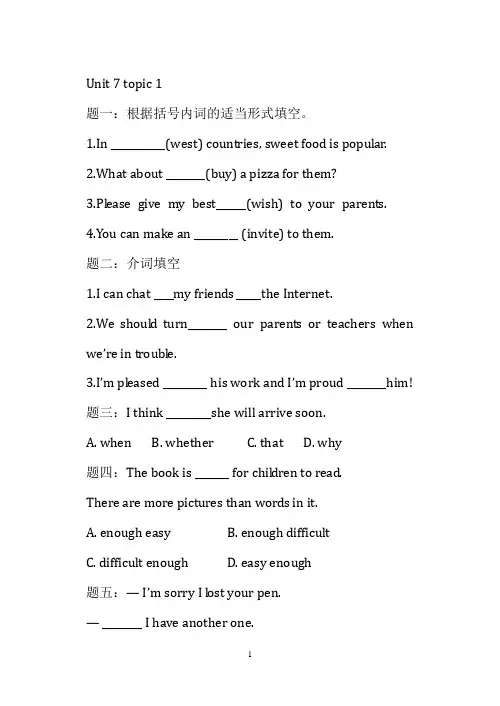
Unit 7 topic 1题一:根据括号内词的适当形式填空。
1.In ___________(west) countries, sweet food is popular.2.What about ________(buy) a pizza for them?3.Please give my best______(wish) to your parents.4.You can make an _________ (invite) to them.题二:介词填空1.I can chat ____my friends _____the Internet.2.We should turn________ our parents or teachers when we’re in trouble.3.I’m pleased _________ his work and I’m proud ________him! 题三:I think _________she will arrive soon.A. whenB. whetherC. thatD. why题四:The book is _______ for chil dren to read.There are more pictures than words in it.A. enough easyB. enough difficultC. difficult enoughD. easy enough题五:—I’m sorry I lost your pen.— ________ I have another one.A.Never mind.B. You’re wel come.C. Give me money.D. Oh, really?题六:Could you please _________ here?It’s a non-smoking restaurant.A. to smokeB. not to smokeC. smokeD. not smoke题七:—Would you like to come to my party this Saturday? — Sure, ________.A. I’m afraid notB. I’d love toC. that’s good enoughD. I do题八:按要求完成句子。
Unit 7 Food Festival Topic 2 I’m not sure whether I can cook it well.(考试时间:90分钟,满分:100分)第一部分第二部分第三部分总分题号ⅠⅡⅢⅣⅠⅡⅢⅣⅠⅡⅢ得分第一部分听力(20分)Ⅰ. 听句子,选择正确答语。
每个句子读一遍。
(5分)( )1. A. Thank you. B. I’m happy. C. Congratulations!( )2. A. Of course not. B. Yes, I would. C. You decide.( )3. A. Fish is delicious! B. Thank you. C. Yes, I’m hungry.( )4. A. Noodles. B. Smoking. C. Apples.( )5. A. Oh, I know.B. Why not send him to see a doctor?C. I’m sorry to hear t hat.Ⅱ. 听对话及问题,选择正确答案。
每段对话及问题读两遍。
(5分)( )6. A. No, h e doesn’t. B. Yes, he does. C. He doesn’t want to tell her. ( )7. A. The knife. B. The fork. C. The spoon.( )8. A. Lemonade. B. Tea. C. Coffee.( )9. A. Japanese food. B. Western food. C. Chinese food.( )10. A. Eggs and milk. B. Eggs and porridge. C. Pancakes and porridge.Ⅲ. 听两段对话,选择正确答案。
每段对话读两遍。
(5分)听第一段对话,完成第11,12小题。
仁爱英语八下Unit7 Topic1 导学案Section A学习目标: 1.学习了解宾语从句和其三要素2.重点学习掌握that引导的宾语从句学习过程:一、在文中找到、划出并背诵下面的短语。
1.了解2.开始做某事3.举办美食节4.筹钱5.建造一所学校6.试图做某事7.向老师求助8.制作海报9.与某人取得联系10.在网上11.怎样举办美食节12.尽某人最大的努力13.需要做某事14.摆放餐具15.沏茶16.做巧克力点心二、重难点解读1.Do you know about Craig Kielburger? 译:_______________________________________ 区别:know about---___________ / know---_____________练习: (1) I know her, she is our monitor. 译:_____________________________________(2) He wants to know more about Chinese culture. 译:___________________________ 2.Shall we have a food festival and raise money to give to Free the Children?译:_______________________________思考:have的意思是__________,可以用__________替换。
不定式to give to Free the Children 在句中作_______ 语。
模仿:a.为了庆祝第25个教师节,我们学校将在下周举办一场音乐会。
Our school ______ _______ ___ ________ to celebrate the ________ ___________ __________next week.b.为增强体质,他们每周进行一次篮球比赛。
Unit 7 Food Festival课题:Topic 2 I’m not sure whether I can cook it well.Section A一、学习目标I.单词:pan, pot, cooker, bowl, oil, ingredient, pork, ham, onion, noodle, junkfood; add, fry, cut; finely, lightly, quick, healthilyII.词组:make fried rice, be proud of, cook very carefully, cooked meat, add some bones to, boil some water, well done, make bone soup, cut up ham, fill...with..., taste good III.句型:1. I’m not sure whether I can cook it well.2.I’m proud of you.3.It’s very kind of you.4.Well done!5.Y ou need to add the rice slowly.6.First, ... Second, ... Next, ... Then, ... After that, ... Finally, ...IV.功能:讲述做菜步骤.二、I.听音正音1.根据 P134 U7T2(63) (64)页的单词音标,试读两遍;听单词录音,跟读正音;看音形义性熟背,默写.2.听U7T2 SA 1a 的录音,完成 1b.听 1a 录音,跟读三遍.II.自查自悟读 1a、2a、3a, 找出下列重点短语,翻译并熟记.(1)做炒饭(3)做得好(5)用......装满.....III.自学互学(2)为... 感到骄傲(4)切碎火腿1.我不确定是否能做好它.【文中原句】I’m not sure whether I can cook it well.注意:if (1) “如果“,引导”主将从现”.(2)“是否”,引导宾语从句时=whether,应注意从句时态的变化:当主句是一般现在时时, 从句的时态根据实际情况而定;当主句是一般过去时时,从句也是一般过去时;当从句描述客观事实时,只能用一般现在时,此时,与主句时态无关.(3)只能用 whether 的情况:与 to do 连用;与 or not 连用;做介词宾语等.“文中原句“=I’m not sure I’m thinking aboutHe doesn’t mindI can cook it .I will appear at his party. it’s good ornot.2.你真是太好了.(太感谢你了.)【文中原句】It’s kind of you.【拓展】It’s+adj.+of sb.+to do sth.与It’s+adj.+for sb.+to do sth.的区别:当形容词形容 sb.的品质时,用介词 of;当形容词形容 to do sth.的性质时,用 for.请思考:(1)It is very helpful you to help me.(2)It is very important us to learn English well.3.首先,精细地切些熟肉.【文中原句】First, cut some cooked meat very finely.副词修饰动词时,通常放在动词后面.(1)认真地烹饪(2)小心地把锅放到炊具上(3)轻轻地炒一炒肉4.干得好!【文中原句】!表示表扬和鼓励的句子.类似的表达还有:Very good!非常好!Wonderful!非常好! Excellent!好极了!Perfect!太棒了 Good job! 干得好!5.你需要慢慢的添加米饭.【文中原句】You need to the rice .【拓展】add v. 增加,添加; add to... 添加到......上;add... to...将......加到上;(1)如果茶太浓, 就加点水.(2)4 加6 等于 10.If yousome water if the tea is too strong.4 _ 6, you can get 10.(3)你有什么要添加到清单上吗?Do you have anything to6.第二步,然后把火腿、白菜和青菜细细地切碎.the list?【文中原句】Then harm, and green .(1)完成一件事需要一连串的动作,需要一些表示先后顺序的副词.First, ...Second, ... Next, ... Then, ... After that, ... Finally, ...首先......,其次......,接下来......,然后......,之后......,最后......(2)cut... up(动副短语)将... 切碎.【拓展】cut sth.切开;cut sth. into (small pieces)将切成(碎片)昨天他割伤了自己.He厨师把牛肉切成薄片.The cook himself yesterday.the beef thin slices.【拓展】cut off 切断;中断;cut down v. 削减;砍倒;cut in 插嘴;超车;插入cut out 切断;删去;停止;关掉cutback 削减;修剪;cut short v. 缩短;打断;缩减cut from 从…上切下cut through 刺穿;抄近路走过四、当堂检测I.用所给词的适当形式填空1.The tea is too strong. You need (add) some more water slowly.2.Dongdong is preparing the (cook) meat now.3.I think rice is grown in the (south) part of China.4.Can you say five kinds of fruit (immediate)?5.They are always smiling and friendly and (politely) to passengers.II.阅读短文,根据语篇要求填空,使短文通顺、意思完整.每空限填一词.Kangkang wants to make fried rice for their food festival.But he is not sure he can cook it well. His mother is of him because he is trying to help others. She tells Kangkang to cut some cooked meat veryfirst, put some oil in the pan,and then fry the meat . After that,Kangkang needs to add the rice slowly, fry it for a few minutes and finally add some salt. He thinks is fun!一、学习目标U n i t7F o od Festival课题:Topic 2 I’m not sure whether I can cook itwell.Section BI.单词:snack, butter, pear, piece; slurp; impolite, polite, noisilyII.词组:favorite snack, a sandwich with butter, how to make it, two pieces of bread, put...over, put...together, cut...into small pieces, learn to make it from you,quite well, do better, do bestIII.句型:1. Could you tell us how to make it?2.Take two pieces of bread and put some butter on them.3.Would you mind if we learn to make it from you?4.You did quite well. But I think you did better than I. Michael did best of all.5.Practice makes perfect.6.I don’t know if it is polite in Japan.IV.功能:做菜步骤;副词比较级、最高级.二、自I.听音正音1.根据 P134 U7 T2 (65) (66) 页的单词音标,试读两遍;听单词录音,跟读正音;看音形义性熟背,默写.2.听U7T2 SB 1a 的录音,完成 1b.听 1a 录音,模仿跟读三遍.II.自查自悟读 1a、1c, 找出下列重点短语,翻译并熟记.(1)最喜欢的小吃(2)怎么做(三明治)(3)两片面包III.自学互学(4)切成碎片1.你介意我们向你学习做三明治吗?【文中原句】Would you mind if we learn _to makeit from you?learn 用法归纳:learn sth 学习……; learn to do sth 学习做某事;learn sth by oneself 自学……=teach oneself sth;learn (…) from sb 向某人学习(做某事);和 study 的区别:study 可以作不及物动词,如I’m studying now. study 也可以作不及物动词,不过 study sth 更强调研究…, learn 强调学习具体的知识,如 learn English.2.你做得很好.【文中原句】You did quite .但是我认为你比我做得好.【文中原句】But I think you did than I.我们所有人中迈克做得最好.【文中原句】Michael did .well, better, best 都是副词,作动词 did 的状语.better, best 是 well 的比较级和最高级.【拓展】形容词、副词有三个等级,即原级、比较级和最高级.(1)形容词、副词比较等级的构成.①副词比较等级的规则变化与形容词比较等级的规则变化大致相同.fast-- late-- slowly-- hard --noisily-- _ quickly-- _②下列副词的比较等级为不规则变化:badly -- little -- well-- much--far-- /(2)形容词和副词比较等级的用法.①原级:双方程度相同时,常用结构:as+adj./adv. 原级+as,意为:......和......一样.... .否定形式:not as/so+adj./adv.原级+as,意为:......不如... .他跑得如此快.He runs so .莫扎特和他姐姐弹得一样好.Mozart played his sister. Maria 没有 Jane 学习努力.Maria doesn’t study Jane.② 比较级:两者比较时,常用结构:adj./adv.比较级+than,意为:比......更 ....... .否定形式:less+adj./adv.原级+than,意为:......不如 ... . 他比我游得好.He swam _________________ than I. 他做作业比他哥哥认真.He does homework than his brother. 他工作的时间比以前少了.He works than he used to. ③ 最高级:三者或三者以上作比较时,常用结构:the+ adj./adv.最高级+ in/of/among....... (比较范围),意为:某人(或某物)在某范围内最 ........ .副词最高级前可省略 the. Michael 在我们班跳得最高.Michael jumps in our class. 我是我们班跳得最远的.I jump in my class.3. 我不知道在日本这么做是否有礼貌.【文中原句】 I don’t know if it’s polite in Japan.if conj. 是否,引导宾语从句,不可省略. 四、当堂检测 I. 单项选择( )1. Could you tell me ___it is true or not?A. ifB. whetherC. thatD. what( )2. It’s polite___up your hand before answering the questions.A. putB. puttingC. putsD. to put( )3. In Japan, it’s polite to eat soup___and finish all the rice.A. noisilyB. noiseC. noisyD. noises( )4. We’re not sure___we will go out tomorrow. We will go swimming ___it is sunny.A. if; whetherB. if; thatC. whether; ifD. what; if( )5. -Do you think Michael works ___ than Kangkang and Jane?-Yes, I think so. He works ___of the three.A. hard; harderB. harder; hardestC. hardest; hardD. hardest; harderII.用方框内所给词的适当形式填空Micheal’s favorite snack is a sandwich butter, honey and a pear. Do you knowto make it?, take two pieces of bread and put some butter on them. Next, cut a pearinto small pieces . Then put them on the bread lightly. After that, put some honey the pear slowly. Finally, put the pieces of bread . Micheal,Janeand Kangkangthe sandwich together. Kangkangverywell. Jane did better. Micheal didof all. We all know that practice makes .一、学习目标 Unit 7 Food Festival课题:Topic 2 I’m not sure whether I can cook itwell.Section CI. 单词:formal,manner,napkin,fork, dish,quietly,dine,spoon,chopstick,finger, lap,elbow. II. 词组:for the first time, table manners, eat up, drink to sb./ sth. III. 句型: 1. It’s polite to eat up the food on your plate.2. You don’t know whether it’s polite or not to speak loudly at the table.3. Remember not to drink too much. IV. 功能:谈论不同国家的餐桌礼仪.二、make, together, good, one, how, do, perfect, with, over, careI.听音正音1.根据 P134 U7 T2(67)(68)页的单词音标,试读两遍;听单词录音,跟读正音;看音形义性熟背,默写.2.听U7T2SC 1a 的录音,完成 1b、1c.听 1a 录音,跟读三遍.II.自查自悟1.读1a,找出下列重点短语,翻译并熟记.(1)以...开始(3)吃光(5)举起杯子(7)指向某人III.自学互学(2)餐桌礼仪(4)为某人敬酒,干杯(6)喝太多1.如果你首次参加一个正式的西餐聚会,你最好知道一些西方的餐桌礼仪.【文中原句】If you go toa dinner party , you had better knowabout .(1)for the first time 第一次2012 年,我第一次到北京去度假.I went to Beijing for my holiday in2012 .(2)table manners 餐桌礼仪manner“方式;举止;态度”He has no at all. 他一点也没礼貌.2.吃光盘中的食物是礼貌的.【文中原句】It’s polite the foodthe plate.eat up 动副结构:吃完,吃光他如此饿,以至于吃完了所有的食物.He was so hungry he allthe food.把它吃光!Eat !【拓展】come up 上升; cut up 切碎; get up 起床give up 放弃; go up 上涨; stay up 熬夜; take up 占用;3.可能你不知道在用餐时大声说话是否礼貌.【文中原句】you don’t knowwhether it’s polite to speak loudly the table.whether , if 的用法我们在 Section A 中已经学过,现在来复习巩固一下.(1)引导宾语从句时,可互换.He asked me Tom was late.他问我 Tom 是否迟到了.(2)whether 后可接 or not,而if 不能.He doesn’t know it’s right or not.他不知道这是否是对的.(3)不定式前用 whether 而不用 if.I don’t know?/to go or to stay at home.我不知道是该走还是该留在家里.(4)介词后用 whether 而不用 if.I’m thinking about to leave right now.我在考虑是否马上离开.(5)注意引导宾语从句时从句的时态变化.My teacher told me the earth round the sun. 老师以前告诉我地球绕着太阳转.He wondered if she .他想知道她是否会来.4.记得不要喝太多.【文中原句】Remember _drink too much.(1)remember to do s th.记得要做某事; remember doing s th.记得做过某事(事情已经做了),否定形式为:remember not to do sth. .Please remember the door.请记得关门.Iremember the door. 我记得关上门了.Remember late. 记着别迟到啊.(2)too much 在句中作状语,修饰动词 drink.【区分】much too “太,非常”,修饰形容词或副词.too much 修饰动词或动词短语及不可数名词;too many 修饰复数名词Don’t eat candy, or you will be ____________ fat.不要吃太多糖,否则你会很胖.Although apples are good, still don’t eat of them.四、当堂检测I.汉译英.[来来~源:%^*中教网&]1.露西昨天吃完了冰箱里的所有苹果.Tom the in thefridge. 2.我们的问题是如何能给丹尼尔筹钱.Our problem is raise money Daniel.3.这鱼闻起来真美味.我想把它吃完.The fish . I want to .4.(为了) improve his oral English, he often goes to the English corner.5.Our English class often (以……开始) a lively song, so we all like it.6.When he was (为……干杯) me, I gave him a hug.7.The child is at the age of two, he needs someone to (切碎) his food for him.II.把下列句子合并成一个含有宾语从句的复合句.1.I don’t know. Is she a nurse?2.Do you know? Is it good to play games too much?3.I’m not sure. Is he at school?4.I want to know. Will it be sunny tomorrow?5.I don’t know. Is it polite to eat up the food on your plate?一、学习目标Unit 7 Food Festival课题:Topic 2 I’m not sure whether I can cook itwell.Section DI.单词:southern, pick, courseII.词组:pick up, around the world, use … to do …III.句型:1. People around the world have different eating habits.2.There are two or more courses for every meal and people use knives and forks to eat.3.In parts of India, people use their fingers to pick upthe food. IV.复习 whether/if 引导的宾语从句的用法.副词的比较级.V.功能:谈论不同国家的饮食风俗.I.听音正音1.根据 P136 U7 T2(69)(70)页的单词音标,试读两遍;听单词录音,跟读正音;看音形义性熟背,默写.2.听U7T2SD 1 的录音,模仿跟读三遍.3.Read the passage again and underline all the different eating habits in different areas.II.自查自悟读 1a、1c, 找出下列重点短语,翻译并熟记.(1)远离(3)同时III.自学互学(2)用…做某事1.全世界的人们有不同的饮食习惯.【文中原句】People havedifferent eating .around the world = all over the world = throughout the world “全世界”那是众所周知的. It is known【拓展】living habit 生活习惯; learning habit 学习习惯2.在北美,澳大利亚和欧洲,每顿饭有两道或两道以上的主菜,人们用刀叉吃饭.【文中原句】 In and , there are two or more each meals and peopleuse_and forks .(1)course 可数名词,意为“一道菜”.主菜是烤鸭.Themain(2)A knife and a forkA knife and forkis the roast duck.(be) on the table. 一把刀和一把叉在桌上. (be) on the table. 一副刀叉在桌上.3.在印度有些地方,人们用手指头拿食物吃.【文中原句】In parts of , people use their fingers the food.(1)pick up 拿起,捡起;接某人;取某物;搭便车.电话铃响了,我拿起了话筒.The phone rang and I 我的哥哥会开车来接你的.My brother willityou.in the car.(2)use … to do sth 表示“用…做某事”还可以表达成use… for doing sth. 如:We can use QQ (talk) /for(talk) with each other.4.在中国的南方人们吃米多,而在北方人们常吃面食.【文中原句】In China, people eatrice a lot, in the_people often eat _ .south, n. 南方;southern, adj. 南方的海南岛在中国的南部.Hainan island is in the of China.【拓展】north → northern, east → eastern, west → western四、当堂检测I.完成下列句子:1.汤姆跑的和杰克一样快.彼得跑的最快.Tom runs Jack. Peter runs of all.2.朱迪舞跳得比我好.玛丽是所有的女孩中跳舞跳得最好的.Judy dances than me. Mary dances of all the girls.3.他打篮球比你棒的多.He plays basketball than you.4.雪下得越来越大.It is snowing .5.我想去中国南部的名胜古迹看看.I hoe to visit some in the part of China.II.单项选择:( )1.All Chinese use chopsticks .A. eatB. to eatC. eatingD. ate( )2. I don’t know if Kangkang ,if he _ ,I will call you.] A. will come; will come B. will come; comesC. comes; will comeD. comes; comes( )3. Yesterday Jane’s mother was ill, so she help me.A. needed notB. doesn’t need toC. needn’tD. didn’t need ( )4. Would you mind the door?A. openB. opensC. openingD.I open( )5.–Would you mind if I smoke here? .......... You had better not.A. Of course notB. SorryC. Of courseD. Certainly notⅢ. 句型转换.1.Would you mind opening the door?(改为同义句)Would you mind ________ open the door?2.My favorite food is dumplings. (对划线部分提问)favorite food?3.Do people in India eat with their right hands? Can you tell me?(合并为含宾语从句的句子)4.These courses aren’t the same as those ones. (改为同义句) These courses are _ those ones.5.You’d better cook chicken soup tonight. (改为否定句) You’d cook chicken soup tonight。
仁爱英语八下Unit7 Topic2 导学案Section A学习目标: 1.对宾语从句的进一步学习2.重点学习掌握if/whether引导的宾语从句3.学习副词用法4.学习如何烹饪并讨论烹饪步骤学习过程:一、在文中找到、划出并背诵下面的短语。
1.做炒饭2.我不确定是否...3.尝试帮助别人4.对...感到骄傲5.你真是太好了!6.把煮过的肉精细地切好7.需要做某事8.在平底锅里加油9.把肉稍微炒炒10.把...炒几分钟11.你介意做某事吗12.烧些开水13.熬骨头汤14.把面条煮3-5分钟15.在碗里装满七八成的骨头汤16.垃圾食品17.对...没好处二、重难点解读1. But I’m not sure whether I can cook it well.点拨:I’m not sure whether(是否) + 宾语从句肯定句转换:I’m sure _______ I can cook it well.拓展:whether还可以换为if (是否) 但有区别whether 后面可跟or not , 而if 则不可以练习:a. 我不知道他是否会邀请我参加他们的美食节。
I don’t know _____________ he will _________ me ______ their food festival.I don’t know _____________ he will _________ me ______ their food festival or not.b. 我不确信她是否随后会给你发电子邮件。
I’m not sure ____________ she will _______ you an e-mail later on.I’m not sure ____________she will _______ you an e-mail ______ ______ later on.2. I’m glad that you are trying to help others. 译:点拨:be glad + (that) + 宾语从句为某事高兴be glad to do sth.. 乐意做某事链接:be afraid that+宾语从句be afraid to do sth.be sure that + 宾语从句be sure to do sth.3. It’s very kind of you . 同义句:You are very ________. 点拨:kind---善良,友好回忆: It’s + adj.+ of sb. to do sth. 句中的形式主语是________ 逻辑主语是________ 真正主语是___________练习:a. 告诉我那个消息你真是太好了。
It’s very ______ _____ you _____ ______ ____ the news.b. 他们杀死那些动物真是太残忍了。
It’s very ________ _____ them ______ ____ the animals.拓展:kind还可以用作名词,意思是_________a kind of____________ all kinds of______________4. First, cut some cooked meat very finely. 译:点拨:cooked meat 煮熟的肉cooked在此是过去分词(相当于形容词)作定语链接:fried rice___________ fried chicken__________boiled water____________ boiled eggs____________思考:你发现过去分词(相当于形容词)作定语有什么特点了吗?5. Cut up ham, cabbage and green onions finely. 译:点拨:cut up…把…切碎注意: 如果cut的宾语是代词要放在________ 点拨:up在此意思是彻底,完全地链接:eat up_________ use up__________ burn up__________ clean up__________6. Fill the bowl 70%-80% full with bone soup.译:点拨:fill…with …用…把…装满fill 的词性是_______, 词义是________链接:be full of …充满…full 的词性是_______, 词义是________练习:a. 请把瓶子装满水。
Please ________ the bottle _________ water.b. 不要在碗里盛太满的汤。
________ ________ the bowl _______ too _______soup.c. 屋里满是人。
The room ______ _______ ____ people.三、课堂训练I.选择题1. It is very kind him to help others.A. forB. toC. atD. of2. We’d better drink water when we are thirsty. It’s good for our health.A. boiledB. boilingC. cookedD. cooking3. Please put the pork into plate.A. otherB. another’sC. othersD. another4. One of the western fast food is you can eat it in a few minutes.A. disadvantagesB. advantageC. advantagesD. disadvantage5. A lot of people like eating out now because they’re cooking.A. pleased withB. tired ofC. interested inD. surprised at6. Then, the glass 60% full boiled water.A. put, intoB. fill, inC. fill, withD. add, to7. — What will you do first if you make dumplings?— First, I will cut up the meat .A. finelyB. fineC. finallyD. good8. The lake is more than 20 meters . So it must be dangerous to swim there.A. longB. wideC. deepD. deeplyII.根据短文意思,排出正确的顺序Do you know how to cook meat? Let me tell you how to do it. Please listen to me carefully.(a) Then, fry the meat for a few minutes. (b) Next, put some oil and sugar in the pan. (c) First, buy some fresh meat. (d) Finally, and some salt. (e) Second, cut the meat finely.Do you want to have a try?正确的顺序:1. 2. 3. 4. 5.Section B学习目标: 1.对if/whether引导的宾语从句的进一步学习2.回顾形容词副词的比较级最高级学习过程:一、在文中找到、划出并背诵下面的短语。
1.告诉我们怎样制作2.两片面包3.把梨切成小片4.在梨上面放一些蜂蜜5. Would you mind if we learn to make it from you?6.几分钟之后7.你比我做的好8.熟能生巧9.做某事不礼貌10.随便喝汤二、重难点解读1. First, take two pieces of bread and spread butter on them. 译:点拨:a piece of …一片/张/块/条/则…, 后面常跟不可数名词拓展:a piece of paper______________ a piece of glass_______________a piece of furniture_________________ a piece of music______________a piece of advice______________ a piece of information_________________ 练习:a. 我有三条消息要告诉你。
I have ________ __________ ______ __________ to tell you.b. 两块冰足够了。
________ ____________ ____ ________ are enough.2.Would you mind if we learn to make it from you? 译:思考:句中Would you mind if 后面是___________从句链接:Would you mind (not) doing sth. __________________Would you mind sb./sb.’s doing sth. _________________注意:对Would you mind…? 表示同意的回答,用No, not at all. 或Of course not.或Certainly not…表示反对的回答,用Yes, you’d better not…练习:a. 我打开门你介意吗?Would you _______ ____ I open the door?= Would you _______ ____ opening the door?b. 打开电视你介意吗?Would you _______ _________ ______ the TV?c. 别在这吸烟你介意吗?当然不。
Would you _______ _________ smoking here?___ ________ ____.3.Michael did best of all. 译:点拨:of all 在所有的当中(数量大于等于3的范围),常用于最高级的句子中此句中,修饰动词did的best前面省略了_______, 这种情况只有在_____词的最高级前可以出现练习:a. 在所有的学生当中,他是最高的。